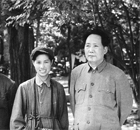Government and Policy
Government workers lose 'iron bowl'
By Zheng Caixiong and Mo Xuan (China Daily)
Updated: 2010-02-05 07:36
 |
Large Medium Small |
Salaries to be based on merit, seven professional ranks
GUANGZHOU: The salaries and other welfare benefits of about 70 percent of the civil servants in the southern city of Shenzhen will not be linked to their official rankings after a new appointment system is introduced this year.
But their salaries will be linked to their professional ranks, according to Wang Min, director of Shenzhen's Department of Human Resources and Social Security.
"These civil servants will have no official rankings, but they will be grouped into seven professional ranks according to their abilities and work performances," Wang said at a press conference.
The new system indicates that the "iron bowl", a term in Chinese that means a stable occupation for life, of the civil servants will be broken, according to Wang.
Currently the salaries and other social welfare of the city's civil servants are directly connected to their official rankings.
The new appointment system offers new professional channels and platforms for the civil servants who do not hope to become leaders or are not suitable to be in leadership positions. They will still be able to develop their abilities and increase their incomes, Wang said.
Shenzhen, which borders the Hong Kong special administrative region, has planned to recruit about 1,000 civil servants every year under the appointment system starting this year.
"The salary of a university graduate who becomes a civil servant at the age of 25 will not be less than that of a county-level official between 40 to 50 years old, if he or she works hard," Wang said.
The new system is expected to help the southern metropolis attract more high-quality talent, Wang added.
Chen Tianxiang, a professor from the management school of politics and public affairs at the Guangzhou-based Sun Yatsen University, said the appointment system will help improve the management of civil servants and encourage them to develop their abilities.
Zheng Fenming, director of the Scientific Development and Public Policy Center at the Guangdong Academy of Social Sciences, said Shenzhen's reform of the civil servant system will play an active role in preventing and reducing corruption.
"The traditional official ranking standard will become weaker after the appointment system is introduced," Zheng said.
Ou Mengjian, a prison police officer in Guangzhou, capital of Guangdong province, said the reform is good news for the people who have ability.
"But it is bad news for those who become a civil servant from the back door," Ou said.












